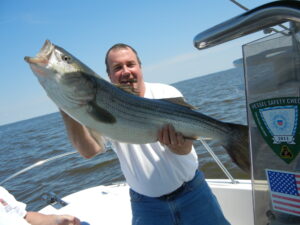
By DJ Rippert
Political action regarding the Chesapeake Bay is increasing. Here is a summary of some key issues ….
Menhaden victory. The Chesapeake Bay Foundation reports, “The Virginia House and Senate have passed bipartisan legislation to transfer management of Virginia’s menhaden fisheries from the General Assembly to the Virginia Marine Resources Commission (VMRC).” The long-running battle over who should regulate Virginia’s menhaden fishery has been extensively covered by Bacon’s Rebellion. You can read some of the more recent posts here, here and here. This change in regulatory venue has been long demanded by environmentalists and opposed by reduction fishery Goliath Omega Protein.
Commentary: This is a very positive change for the Chesapeake Bay. Menhaden will still be caught in Virginia waters but the regulation of that fishery will now be scientifically managed by the VMRC. The simple fact is that the Democrats have removed one corrupt burr from under the saddle of Virginia’s state government. This change in attitude was catalyzed by aggressive federal action by the Trump Administration. Good for both Virginia’s Democrats and Trump’s Commerce Department. Specific kudos to state Senator Linwood Lewis, D-Accomack, Del. Ken Plum, D-Fairfax, Senate committee chair Chap Petersen, D-Fairfax, Governor Ralph Northam, and U.S. Commerce Secretary Wilbur Ross.
Should Virginia join Maryland in suing Pennsylvania? Maryland’s Republican Governor Larry Hogan has directed his attorney general to file suit against both Pennsylvania and the Trump Administration’s Environmental Protection Agency (EPA) over the alleged lack of compliance in Chesapeake Bay cleanup efforts by Pennsylvania. While suing Pennsylvania for its lack of progress in Bay cleanup seems logical, why sue the EPA? As Fox43 reports, “The Maryland government claims the EPA is not holding Pennsylvania properly accountable for its actions in this matter. Therefore, it is the right of the state to also pursue legal action against the EPA.” Unsurprisingly, the EPA disagrees with Maryland. Meanwhile, Virginia Governor Ralph Northam is considering having the Old Dominion join Maryland in the lawsuit.
Commentary: After years of foot dragging, Virginia in recent years has joined Maryland in getting serious about cleaning up the Chesapeake Bay. Good. It’s time for Virginia to take the next step and join the suit against Pennsylvania and the Trump EPA.
Rockfish still taking a beating. Last year Bacon’s Rebellion reported on Virginia’s possible cancellation of the trophy rockfish (aka striped bass) recreational fishing season and the ultimate decision to cancel that season. Maryland allowed the trophy season to progress as usual. This year, Maryland has announced plans to reduce the recreational taking of rockfish by 18% through a delay in the start of the season and other possible measures. So far, I cannot find any description of actions Virginia will take, if any, for the 2020 season. I believe the decision is yet to be made by the VMRC.
Commentary: As an avid fisherman who never misses trophy rockfish season, I believe both states should cancel the recreational trophy season. This would not only be personally disappointing to me but economically painful to the thousands of businesses which support recreational fishing for striped bass in the Chesapeake Bay. However, I remember 1985 when Maryland adopted a strict and total moratorium on fishing for rockfish which lasted for five years. In retrospect, the moratorium achieved its goals. Also in retrospect, it would have been far better to impose limits on striped bass fishing rather than a draconian moratorium. The time for limits is now. Nobody wants to see another moratorium.

Leave a Reply
You must be logged in to post a comment.